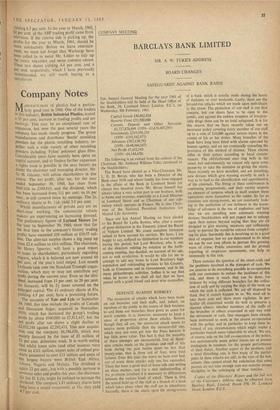Company Notes
MANUFACTURERS Of plastics had a particu- larly good year in 1960. One of the leaders in this industry, British Industrial Plastics, scored a 33 per cent, increase in trading profits and net earnings. This may be an exceptional rate of
expansion, but over the past several years the company has made steady progress. The group manufactures and distributes `Beetle' moulding Powders for the plastic moulding industry, to-
gether with a wide variety of other moulding Powders including `17yIon' polyester glass fibre.
Considerable sums have recently been spent on
capital account, and to finance further expansion a rights issue is possible in the near future; no
doubt the chairman and managing director, Mr. G. H. Glasscy, 'will advise shareholders in due course. The net profit, after tax, for the year ended September 30, 1960, has risen from £445,616 to £589,819, and the dividend, which has been increased from 111 per cent. to 16 per cent., is' still covered twice by earnings. The 2s. Ordinary shares at 8s. 1W. yield 3.9 per cent. Whilst manufacturers of private cars are on short-time working, the commercial vehicle makers are experiencing an increasing demand. The preliminary figures of Leyland Motors for the year to September 30, 1960, show that for the first time in the company's history trading profits have exceeded £10 million at £10.57 mil- lion. The after-tax surplus shows a big jump up from £2.6 million to £4.6 million. The chairman, Sir Henry Spurrier, will have a good report to make to shareholders, particularly regarding exports, which it is believed are now around 60 Per ccnt, of the year's total output. Last month I-, eYlands took over the Standard-Triumph organ- isation, which may or may not contribute any Profit during the current year. Even so the divi- dend, increased from 15 per cent. to 20 per gent. (as forecast), will be 21 times covered on the
enlarged capital. The £1 ordinary shares at 81s. Yielding 4.9 per cent, have a promising future. The accounts of Tate and Lyle to September 30, 1960, this time include the profits of Canada
and Dominion Sugar, acquired in November,
1959, which has increased the group's trading Profit by about £900,000 to £7,812,447, but the
net profit after tax shows a slight decline at
£2,032,188 against £2,292,433. This new acquisi- tion cost the company £6,386,670, which was mainly financed by the issue of £5 million of 51 per cent, debenture stock. It is worth noting that whilst home sales (and other income) were Close on £101 million, export sales of refined pro- ducts amounted to over £33 million and some of the largest buyers were British East Africa, Ghana, Nigeria and Malaya. The dividend is again 12 per cent., but with a possible increase in overseas sales and profits this year, the chairman, Sir Ian D. Lyle, might be inclined to increase the dividend. The company's £1 ordinary shares have Ithig been a sound investment; at 51s. they yield 4.7 per cent.


































 Previous page
Previous page